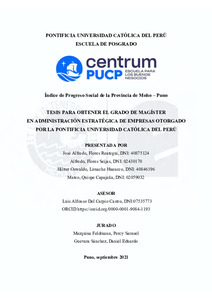| dc.contributor.advisor | Del Carpio Castro, Luis Alfonso | |
| dc.contributor.author | Flores Reategui, Jose Alfredo | |
| dc.contributor.author | Flores Seijas, Alfredo | |
| dc.contributor.author | Limache Huancco, Hiltter Oswaldo | |
| dc.contributor.author | Quispe Capajaña, Mateo | |
| dc.date.accessioned | 2021-11-23T22:57:44Z | |
| dc.date.available | 2021-11-23T22:57:44Z | |
| dc.date.created | 2021 | |
| dc.date.issued | 2021-11-23 | |
| dc.identifier.uri | http://hdl.handle.net/20.500.12404/20952 | |
| dc.description.abstract | El Índice de Progreso Social es una herramienta que mide el progreso social de una
región a partir de un modelo holístico compuesto por temas relevantes para la sociedad; reúne
los valores de doce componentes interrelacionados en tres dimensiones: necesidades humanas
básicas, fundamentos de bienestar y oportunidades, es aplicable a distintas unidades de análisis,
por ende sus resultados capturan e informan sobre el cumplimiento de los Objetivos de
Desarrollo Sostenible en los diferentes niveles de gobierno: nacional, regional, provincial y
distrital.
En ese sentido, el propósito de la presente investigación fue medir el Índice de Progreso
Social para el 2019 en la provincia de Moho y sus distritos. La muestra seleccionada estuvo
constituida por 376 hogares zonificados por los cuatros distritos de la provincia. Posteriormente
el desarrollo de la metodología permitió determinar cuarenta y cuatro indicadores para la
estructura del IPS. Obteniendo como resultado que el IPS de la provincia de Moho para el
2019 se ubicó en el nivel muy bajo con 43.90 puntos, donde resalta el distrito de Conima con
41.75 puntos. Los resultados por dimensiones, muestra que la dimensión Necesidades humanas
básicas alcanzo el mayor puntaje con 55.56, seguida de Fundamentos de bienestar con 40.68 y
Oportunidades con 35.47 en un nivel muy bajo.
El análisis evidencia que la provincia de Moho presenta importantes debilidades en las
en las tres dimensiones del IPS; manifestado por las deficiencias en los servicios de
comunicación e información, el acceso a los estudios superiores, los derechos ciudadanos y las
condiciones de habitabilidad de la vivienda y en el acceso a los servicios de electricidad, agua
potable y saneamiento. Estos resultados sirven como herramienta para proponer e implementar
acciones desde los sectores civil, público y privado con el propósito de alcanzar niveles óptimos
de bienestar para los habitantes de la provincia de Moho. | es_ES |
| dc.description.abstract | The Social Progress Index is a tool that measures the social progress of a region from
a holistic model composed of relevant topics for society; gathers the values of twelve
interrelated components in three dimensions: basic human needs, foundations of well-being
and opportunities, it is applicable to different units of analysis, therefore its results capture
and report on the fulfillment of the Sustainable Development Goals at different levels of
government: national, regional, provincial and district.
In that sense, the purpose of this research was to measure the Social Progress Index
for 2019 in the Moho province and its districts. The selected sample consisted of 376
households zoned by the four districts of the province. Fortunately, the development of the
methodology made it possible to determine forty-four indicators for the structure of the IPS.
Obtaining as a result that the IPS of the province of Moho for 2019 was located at the very
low level with 43.90 points, where the district of Conima stands out with 41.75 points. The
results by dimensions show that the Basic Human Needs dimension reached the highest score
with 55.56, followed by Well-being Fundamentals with 40.68 and Opportunities with 35.47
at a very low level.
The analysis shows that the province of Moho presents important weaknesses in the
three dimensions of the IPS; manifested by deficiencies in communication and information
services, access to higher education, citizens' rights and the living conditions of the home and
in access to electricity, drinking water and sanitation services. These results serve as a tool to
propose and implement actions from the civil, public and private sectors in order to achieve
optimal levels of well-being for the inhabitants of the Moho province. | es_ES |
| dc.language.iso | spa | es_ES |
| dc.publisher | Pontificia Universidad Católica del Perú | es_ES |
| dc.rights | info:eu-repo/semantics/openAccess | es_ES |
| dc.rights.uri | http://creativecommons.org/licenses/by-nc-nd/2.5/pe/ | * |
| dc.subject | Indicadores económicos--Moho (Puno : Provincia) | es_ES |
| dc.subject | Indicadores sociales--Moho (Puno : Provincia) | es_ES |
| dc.title | Índice de progreso social de la provincia de Moho – Puno | es_ES |
| dc.type | info:eu-repo/semantics/masterThesis | es_ES |
| thesis.degree.name | Maestro en Administración Estratégica de Empresas | es_ES |
| thesis.degree.level | Maestría | es_ES |
| thesis.degree.grantor | Pontificia Universidad Católica del Perú. CENTRUM | es_ES |
| thesis.degree.discipline | Administración Estratégica de Empresas | es_ES |
| renati.advisor.dni | 07535773 | |
| renati.advisor.orcid | https://orcid.org/0000-0001-9084-1193 | es_ES |
| renati.author.dni | 40875124 | |
| renati.author.dni | 02430170 | |
| renati.author.dni | 40846196 | |
| renati.author.dni | 02059032 | |
| renati.discipline | 413307 | es_ES |
| renati.juror | Percy Samoel Marquina Feldman | |
| renati.juror | Daniel Eduardo Guevara Sanchez | |
| renati.level | https://purl.org/pe-repo/renati/level#maestro | es_ES |
| renati.type | https://purl.org/pe-repo/renati/type#tesis | es_ES |
| dc.publisher.country | PE | es_ES |
| dc.subject.ocde | https://purl.org/pe-repo/ocde/ford#5.02.04 | es_ES |






